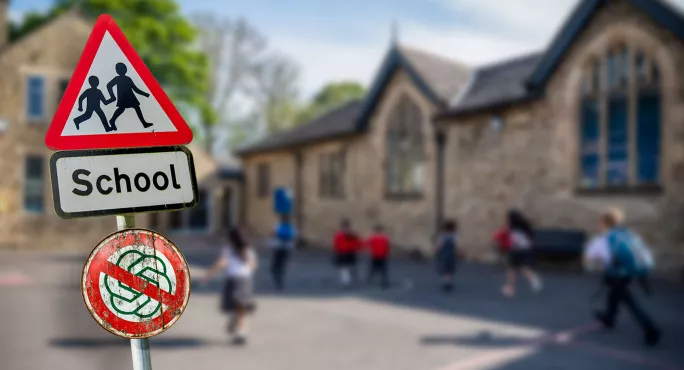
Teachers call for more clarity on cheating with AI

Teachers are calling for the Scottish Qualifications Authority (SQA) to provide more clarity on what constitutes using generative artificial intelligence (GenAI) to cheat and plagiarise.
According to , school staff are finding it difficult to determine the authenticity of their studentsŌĆÖ work, and also to confront learners when they think AI has been used.
It is a struggle to definitively prove that AI has been used if students deny it, they say.
Teachers also fear that relationships with students could suffer if they are accused of plagiarism but deny any wrongdoing.
Checking legitimate use of AI
Some teachers think the only way to guarantee the legitimacy of tests and assessments is through ŌĆ£traditional, closed-book assessmentsŌĆØ, according to the research.
However, others believe that, while assessment has to change, it is important to ŌĆ£embrace and workŌĆØ with GenAI.
One suggested that ŌĆ£oral verificationŌĆØ could be used to confirm that students who use GenAI actually understand ŌĆ£what theyŌĆÖre writing aboutŌĆØ.
- Background: Half of educators use AI for teaching, finds SQA survey
- Related: ŌĆśGenuine riskŌĆÖ Scottish education ŌĆświll be left behindŌĆÖ
- Last week: SQA announces changes to 2025 exam timetable
The research - which involved focus groups with 33 participants, including 16 teachers, nine college lecturers and eight other education practitioners - also reflects concerns that banning AI tools such as ChatGPT would risk driving their use underground and making students unwilling to be open about how they are using AI.
One participant in the research said: ŌĆ£One of the biggest challenges is we need to quickly get over this idea that using ChatGPT is cheating. That then makes it all secretive.ŌĆØ
Students also need to understand that ŌĆ£copying stuff off ChatGPT wonŌĆÖt ultimately help your learningŌĆØ - just as ŌĆ£copying stuff off the internet doesnŌĆÖt help your learningŌĆØ.
AI ŌĆścould widen attainment gapsŌĆÖ
However, not all students are adept at using GenAI, the participants reported - with some expressing concerns that, in particular, students from disadvantaged backgrounds have less access to it and this could, over time, exacerbate the attainment gap.
The research is the latest phase of the SQAŌĆÖs research into examining the attitudes of teaching professionals and education practitioners towards GenAI in education. It follows published last year.
Another ŌĆ£common concernŌĆØ raised in the new surveyŌĆÖs focus groups is the lack of student awareness around the strengths and weakness of GenAI content. Students do not understand how AI works and are overly trusting that it is accurate, the participants report.
One teacher said: ŌĆśI donŌĆÖt think our young people have got a clear understanding of bias or a clear understanding that AI is not telling the truth.ŌĆØ Another said that AI responses were often based on ŌĆ£sub-standard sourcesŌĆØ that they would not allow their students to reference.
The research does highlight potential benefits of AI, including in supporting pupils with additional needs, reducing teacher workload and enhancing learning.
Students could use AI as ŌĆ£a support to creativityŌĆØ to get them beyond ŌĆ£staring at that blank piece of paperŌĆØ, it says.
The Scottish government today confirmed that a project using AI to help teachers with administrative tasks was being taken forward as part of the CivTech programme.
TeachersŌĆÖ ŌĆśstrong appetiteŌĆÖ for guidance on AI
The SQA research finds ŌĆ£a strong appetite among practitioners for more guidanceŌĆØ on AI.
In terms of subject-specific guidance, practitioners wanted to know:
- What kind of GenAI tools were appropriate to use for their subject area.
- How these tools can be used to support learning.
- How much use of these tools is acceptable.
- What the risks and opportunities are for each tool.
╠²
The report states: ŌĆ£There was consensus that GenAI needs to be incorporated into education. However, there were differing opinions as to whether the integrity of current assessment methods can be maintained with GenAI incorporated, or whether there should be a reconceptualisation of what skills are being assessed, with GenAI use being a skill in and of itself.ŌĆØ
Theodore Pengelley, the SQAŌĆÖs digital learning development manager, said the new research would be used to ŌĆ£review and adapt SQAŌĆÖs GenAI statement for the 2024-25 academic yearŌĆØ.
He said the next phase of research will aim to get learnersŌĆÖ views on GenAI use in education.
However, there was a sense of urgency in the responses from educators.
One said: ŌĆ£We absolutely need to take the bull by the horns and we need to get moving on this. But weŌĆÖre still kind of talking about it, right? Nothing feels as if itŌĆÖs moving quickly enough.ŌĆØ
For the latest in Scottish education delivered directly to your inbox, sign up for TesŌĆÖ The Week in Scotland newsletter
You need a Tes subscription to read this article
Subscribe now to read this article and get other subscriber-only content:
- Unlimited access to all Tes magazine content
- Exclusive subscriber-only stories
- Award-winning email newsletters
- Unlimited access to all Tes magazine content
- Exclusive subscriber-only stories
- Award-winning email newsletters
You need a subscription to read this article
Subscribe now to read this article and get other subscriber-only content, including:
- Unlimited access to all Tes magazine content
- Exclusive subscriber-only stories
- Award-winning email newsletters
- Unlimited access to all Tes magazine content
- Exclusive subscriber-only stories
- Award-winning email newsletters
topics in this article



